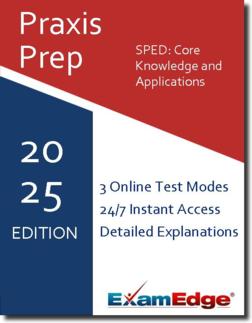Praxis Special Education: Core Knowledge and Applications (5355) Practice Tests & Test Prep by Exam Edge - Topics
Based on 28 Reviews
- Real Exam Simulation: Timed questions and matching content build comfort for your PRAXIS Special Education Foundational Knowledge test day.
- Instant, 24/7 Access: Web-based PRAXIS Special Education Foundational Knowledge practice exams with no software needed.
- Clear Explanations: Step-by-step answers and explanations for your Praxis exam to strengthen understanding.
- Boosted Confidence: Reduces anxiety and improves test-taking skills to ace your PRAXIS Special Education Foundational Knowledge (5355).

Understanding the exact breakdown of the PRAXIS Special Education Foundational Knowledge test will help you know what to expect and how to most effectively prepare. The PRAXIS Special Education Foundational Knowledge has 120 multiple-choice questions The exam will be broken down into the sections below:
| PRAXIS Special Education Foundational Knowledge Exam Blueprint | ||
|---|---|---|
| Domain Name | % | Number of Questions |
| Human Development & Individual Learning Differences | 26% | 31 |
| Effective Planning & Instruction; Productive Learning Environments | 32% | 38 |
| Assessment | 23% | 28 |
| Professional Learning, Practice & Collaboration | 19% | 23 |


